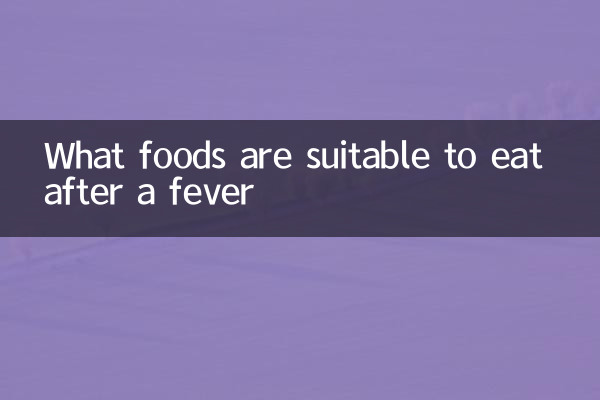What foods are suitable to eat after a fever
Fever is the body's natural response to fight infection or illness, but during a fever, the body uses a lot of energy, so choosing the right foods is crucial to restoring health. This article will combine hot topics and hot content in the past 10 days to provide you with a scientific and practical guide to fever diet.
1. Dietary principles during fever

When you have a fever, your body needs more fluids and nutrients to support your immune system. The following are dietary principles during fever:
| principles | Description |
|---|---|
| drink more water | Fever will cause the body to lose water. It is recommended to drink at least 2 liters of water every day. You can choose warm water, light salt water or coconut water. |
| Easy to digest | Choose soft, easy-to-digest foods, such as porridge, soup, steamed eggs, etc., and avoid greasy and spicy foods. |
| Nutritionally balanced | Eat enough protein, vitamins and minerals to help your body recover. |
| Eat small meals often | Appetite may decrease when you have a fever, so it is recommended to eat in small amounts each time. |
2. Recommended food list
According to recent health hot topics and nutrition expert advice, the following are suitable foods to eat during a fever:
| food category | Recommended food | Efficacy |
|---|---|---|
| liquid food | Rice porridge, millet porridge, pumpkin porridge | Easy to digest, replenishes energy and water |
| protein food | Steamed eggs, tofu, fish | Provides high-quality protein to help repair tissue |
| Vegetables | Carrots, spinach, broccoli | Rich in vitamins and minerals to enhance immunity |
| Fruits | Banana, apple, orange | Supplement vitamin C and electrolytes |
| drinks | Honey water, lemon water, light salt water | Replenish hydration and electrolytes |
3. Foods to avoid
During a fever, some foods may aggravate symptoms or be detrimental to recovery and should be avoided:
| food category | Reasons for not recommending |
|---|---|
| greasy food | Such as fried chicken, fatty meat, etc., which are difficult to digest and may increase the burden on the gastrointestinal tract. |
| spicy food | Such as chili pepper, Sichuan peppercorns, etc., which may irritate the throat and digestive tract |
| High sugar foods | Such as candies, cakes, etc., which may suppress immune function |
| coffee and alcohol | May cause dehydration, affecting recovery |
4. Food therapy plan during fever
In conjunction with recent hot health topics, here are some simple and easy fever recipes:
| Recipe name | Preparation method | Efficacy |
|---|---|---|
| Ginger rice porridge | 100g rice, 10g shredded ginger, add water and cook until soft | Warms the body and promotes sweating |
| Carrot and Pumpkin Soup | 100g each of carrots and pumpkin, cooked and beaten into paste | Supplement vitamin A to enhance immunity |
| honey lemonade | 300ml warm water, 1 slice of lemon, 1 spoon of honey | Supplement vitamin C to relieve throat discomfort |
5. Dietary precautions for special groups of people
Different people may have different dietary needs during a fever:
| crowd | Special considerations |
|---|---|
| children | The food should be softer, and fruit puree and yogurt can be added appropriately. |
| elderly | Pay attention to protein supplementation to prevent muscle loss |
| pregnant woman | Ensure adequate nutritional intake and avoid raw and cold foods |
| diabetics | Control carbohydrate intake and monitor blood sugar |
6. When do you need medical treatment?
While a proper diet can help with recovery, you should seek prompt medical attention if:
| Symptoms | Possible reasons |
|---|---|
| High fever exceeding 39°C that persists | Possible serious infection |
| Unable to eat or persistent vomiting | May cause dehydration |
| Confusion or convulsions | Urgent medical intervention required |
| With severe headache or rash | May be a manifestation of a specific disease |
Conclusion
What you eat during a fever is crucial to regaining your health. You can help your body recover faster by choosing easily digestible, nutrient-dense foods and avoiding irritating foods. Remember to get plenty of rest, drink plenty of fluids, and seek medical attention if necessary. I hope this guide will help you or your family get through the fever and recover quickly.

check the details

check the details